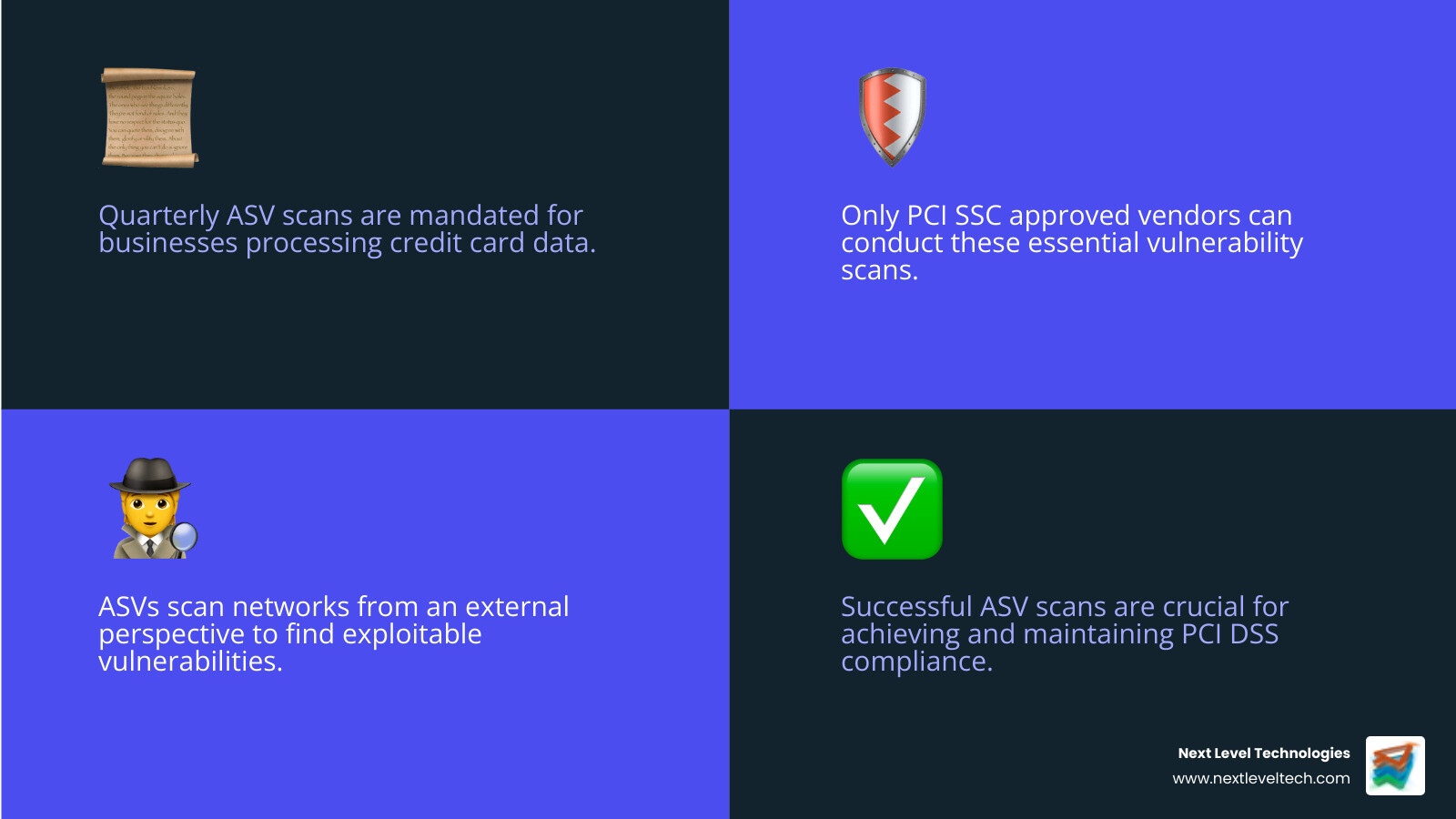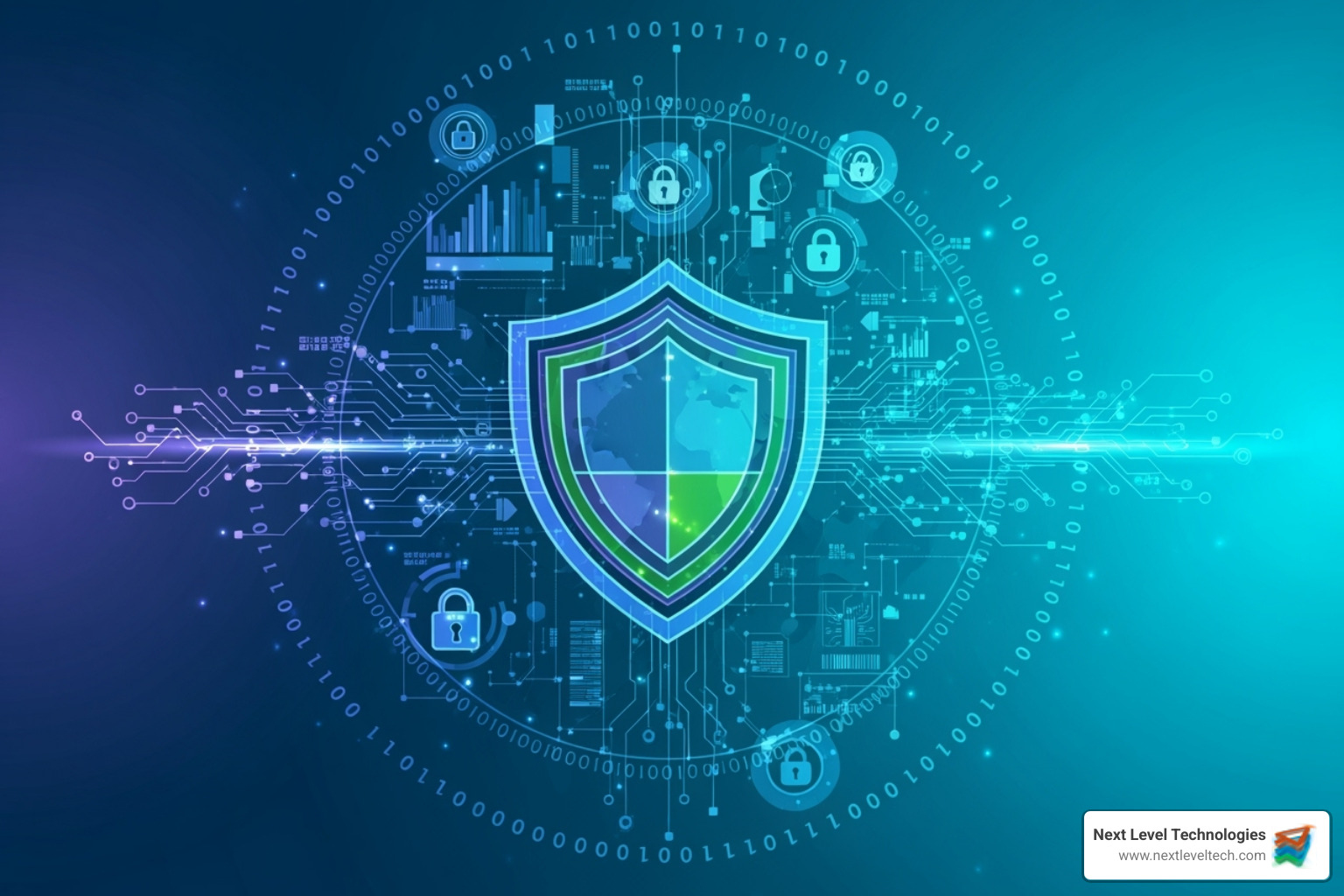The Ultimate Guide to PCI Approved Scanning Vendors
August 13, 2025

Transform your IT! Discover how proactive IT support prevents issues, cuts costs, and secures your business for growth.
February 21, 2026

Discover the benefits of incident management to minimize costly downtime, boost customer trust, and ensure business continuity.
February 19, 2026

Elevate your business with proactive IT Support Charleston WV. Secure, cloud-powered solutions & local expertise for seamless operations.
February 18, 2026
August 13, 2025
An asv approved scanning vendor is a company certified by the PCI Security Standards Council to conduct external vulnerability scans that validate compliance with PCI DSS requirements. These specialized vendors play a crucial role in protecting businesses that handle credit card data from cyber threats and regulatory penalties.
Key facts about ASV approved scanning vendors:
The stakes are high - merchants failing to meet PCI DSS standards can face fines or lose the ability to accept credit card payments entirely. With over 800 billion card transactions projected globally by 2026, ensuring your payment infrastructure is secure isn't optional.
Many businesses struggle with the complexities of ASV selection and compliance management. The process involves technical scanning procedures, detailed reporting requirements, and ongoing vulnerability remediation that can overwhelm internal IT teams.
I'm Steve Payerle, President of Next Level Technologies, and I've helped hundreds of businesses steer PCI compliance challenges across Columbus, Ohio and Charleston, WV over the past 15 years. My team's extensive cybersecurity training and experience with asv approved scanning vendor requirements ensures our clients maintain robust security postures while meeting all regulatory obligations.

Asv approved scanning vendor vocab explained:
Picture this: you're running a business that accepts credit cards, and somewhere out there, cybercriminals are constantly probing for weaknesses in payment systems. That's where an asv approved scanning vendor becomes your digital security guard, standing watch at your network's front door.
An Approved Scanning Vendor (ASV) is essentially a cybersecurity specialist that's been put through the wringer by the PCI Security Standards Council (PCI SSC). These aren't just any tech companies - they're organizations that have proven they can conduct external vulnerability scans with the precision of a Swiss watchmaker and the integrity of a trusted friend.
Think of an ASV as your network's personal health inspector. Just like a restaurant needs regular health inspections to serve food safely, your business needs regular security scans to handle credit card payments safely. The ASV looks at your network from the outside - the same perspective a hacker would have - and identifies any weak spots that could be exploited.
Here's the thing: PCI DSS Requirement 11.2.2 doesn't give you a choice in this matter. If you process, store, or transmit credit card data, you must use an ASV for quarterly external vulnerability scans. It's not a suggestion or a "nice-to-have" - it's mandatory for compliance.
The consequences of skipping this requirement can be brutal. We're talking about hefty fines, increased transaction fees, and in the worst-case scenario, losing your ability to accept credit card payments entirely. For most businesses today, that's essentially a death sentence.

At Next Level Technologies, our team's extensive cybersecurity training has shown us how these scans prevent data breaches and keep businesses compliant. We've seen too many companies in Columbus and Charleston learn the hard way that cutting corners on security isn't worth the risk.
For a deeper understanding of how ASV scans fit into the bigger compliance picture, check out our comprehensive guide on PCI compliance.
Becoming an asv approved scanning vendor is a demanding process. The PCI Security Standards Council (PCI SSC) subjects applicants to a rigorous vetting process to ensure only qualified organizations earn the title. This includes verifying the company as a legal entity, followed by intensive training for all scanning personnel. This training covers everything from vulnerability identification to quality assurance and concludes with a challenging certification exam. The ASV's scanning technology also undergoes stringent testing by the PCI SSC to validate its accuracy and non-disruptiveness. This isn't a one-time approval; ASVs must re-qualify annually, proving their methods and technology keep pace with evolving cyber threats. This tough certification process ensures that any ASV you hire is a trustworthy expert in external security scanning. For detailed information about ASV training requirements, you can explore the official PCI SSC training resources.
Earning the asv approved scanning vendor title comes with significant responsibilities that directly impact your business's security and compliance. Key duties include:
These responsibilities highlight why choosing the right ASV partner is so critical. At Next Level Technologies, our technical expertise and extensive cybersecurity training ensure we understand not just what these responsibilities mean on paper, but how to execute them flawlessly in the real world.
Think of an asv approved scanning vendor scan as a security guard walking around the outside of your building, checking every door and window to make sure they're properly locked. That's essentially what happens during an external vulnerability scan - your ASV takes an "outside-in" perspective to examine your network security and IT infrastructure, looking for any weak spots that hackers might exploit.
The beauty of this approach is that it mirrors exactly how real attackers would try to break into your systems. They don't have inside access to your network - they have to work from the outside, probing for vulnerabilities in your internet-facing systems.

Every internet-facing component of your cardholder data environment gets thoroughly assessed through a structured process that ensures nothing falls through the cracks.
Here's where you become an active partner in the process. Defining the scan scope accurately is absolutely critical - and it's entirely your responsibility as the customer. You need to provide your asv approved scanning vendor with every single IP address, domain, and internet-facing component that's part of your Cardholder Data Environment.
This includes obvious things like your web servers and payment processing systems, but don't forget about mail servers, DNS servers, remote access points, and any other systems that could potentially interact with cardholder data. Even that forgotten test server sitting in the corner could be a vulnerability if it's connected to your network.
But your ASV doesn't just take your word for it. They perform what's called a "findy" process - essentially detective work where their scanning tools actively search for additional internet-facing assets that appear to belong to your organization. Think of it as a double-check to make sure nothing was accidentally overlooked.
If the ASV finds systems you didn't include in your original scope, they'll reach out to discuss whether these should be added to the scan. This collaborative approach helps ensure comprehensive coverage, but remember - you remain accountable for any security compromises that occur through components not included in the scan. Network segmentation plays a crucial role here in limiting your scope and reducing risk.
Our team's extensive cybersecurity training has taught us that proper scoping often makes the difference between a smooth compliance process and a frustrating series of failed scans. For more insights into how we approach comprehensive IT compliance assessments, including proper scoping techniques, check out our guide: Guidance on IT Compliance Assessments.
Once everyone agrees on the scope, the real action begins. Your asv approved scanning vendor releasees specialized, PCI SSC-approved scanning tools that probe your systems for known weaknesses. These aren't gentle inquiries - they're thorough examinations looking for thousands of potential vulnerabilities, from missing security patches to weak configurations.
The scanning process itself is designed to be non-intrusive, meaning it won't disrupt your normal business operations. However, the tools are sophisticated enough to identify misconfigurations, outdated software, weak authentication mechanisms, and insecure services that could provide entry points for attackers.
The analysis phase is where ASV expertise really shines. Raw scan results can be overwhelming and often include false positives that aren't actually security risks in your specific environment. Experienced ASV analysts carefully review every finding, separating genuine vulnerabilities from scanning artifacts.
Each real vulnerability gets assigned a Common Vulnerability Scoring System (CVSS) score, which helps you understand the severity and potential impact. A CVSS score of 4.0 or higher typically requires immediate attention for PCI DSS compliance, while lower scores might be addressed as part of your ongoing security maintenance.
The final deliverable is a detailed scan report that serves as your official compliance documentation. This report clearly indicates whether your systems passed or failed the scan, lists all identified vulnerabilities with their CVSS scores, and provides specific, actionable recommendations for remediation. A passing scan report, accompanied by an Attestation of Scan Compliance, is what you'll submit to your acquiring bank or payment brand to demonstrate compliance with PCI DSS Requirement 11.2.2.
Don't worry if your first scan doesn't pass - it's actually quite common, and it doesn't mean your security is terrible. A failed scan simply means the ASV identified vulnerabilities that need your attention, or there was some interference with the scanning process itself.
The remediation process is straightforward but requires attention to detail. You'll need to address each identified vulnerability, which might involve applying security patches, reconfiguring systems, strengthening access controls, or implementing additional security measures. Our technical experience has shown that most vulnerabilities can be resolved relatively quickly once you know what needs fixing.
After you've addressed the issues, you'll request a re-scan from your asv approved scanning vendor. This cycle continues until you achieve a passing scan. That PCI DSS requires vulnerabilities to be resolved within specific timeframes - typically, high-risk vulnerabilities on networks handling payment card transactions must not persist for more than 90 days.
False positives are another reality of vulnerability scanning. Sometimes a scan might report a supposed vulnerability that isn't actually a security risk in your specific environment. Maybe you have compensating controls in place, or the finding doesn't apply to your particular system configuration.
The good news is that ASVs have a dispute resolution process for exactly these situations. You have the right to challenge scan findings by providing defensible evidence to the ASV assessor. This might include documentation of compensating controls, proof that a system isn't actually vulnerable, or technical explanations of why a finding doesn't apply to your environment.
The ASV assessor will evaluate your evidence and make a determination. These disputes are handled directly between you and your ASV - not through the PCI SSC. Our team's extensive cybersecurity training and technical experience helps clients steer these complex situations, providing the necessary documentation and evidence to support legitimate disputes.
One important note: if scan interference (like from an intrusion prevention system) prevents the ASV from completing their assessment, and you don't resolve the interference, it will be reported as a failed scan. Clear communication with your ASV about your security infrastructure helps avoid these situations.
Selecting the right asv approved scanning vendor can feel overwhelming, especially when you're dealing with something as critical as PCI DSS compliance. The good news? You don't have to steer this decision alone. Think of it like choosing a trusted business partner – because that's exactly what you're doing.

Over the years, I've helped countless businesses in Columbus, Ohio and Charleston, WV make this important choice. The key is knowing what to look for and understanding that not all ASVs are created equal. Some excel at providing clear, actionable reports, while others might leave you scratching your head trying to figure out what to do next.
The first thing you absolutely must do is verify the vendor's current approval status on the official PCI SSC list of approved vendors. This list changes regularly, so don't assume a vendor who was approved last year still holds that status today. It's like checking someone's driver's license before letting them drive your car – non-negotiable.
Technical expertise matters more than you might think. All ASVs use approved scanning tools, but the real value comes from the people behind those tools. Look for vendors whose staff has extensive cybersecurity training and real-world experience. Can they explain vulnerabilities in plain English? Do they understand your specific industry challenges? Our team's deep technical background means we can provide context that goes beyond just identifying problems – we help you understand why something is a risk and how to fix it effectively.
Reporting quality can make or break your compliance experience. You want reports that are clear, detailed, and actionable. Avoid vendors whose reports read like technical manuals written by robots. Good ASVs provide vulnerability details with CVSS scores, practical remediation steps, and clear pass/fail indicators. After all, what good is a report if you can't understand what it's telling you?
The remediation support aspect often separates great ASVs from mediocre ones. While ASVs aren't consultants per se, the best ones offer helpful guidance during the fix-it phase. They should have clear communication channels for questions and knowledgeable assessors who can fairly evaluate disputes or false positives. This support becomes invaluable when you're trying to resolve complex vulnerabilities or dealing with potential false positives.
Consider whether you might benefit from additional managed cybersecurity services beyond just ASV scans. Some vendors offer comprehensive security solutions that can streamline your overall compliance strategy. This integrated approach can be particularly helpful for businesses without large internal IT teams. Our managed cybersecurity services complement ASV scanning to provide a complete security solution.
Finally, don't forget to ask about the vendor's dispute resolution process. False positives happen, and you need a fair, efficient way to address them. A vendor with a clear dispute mechanism and experienced assessors can save you time and frustration when legitimate questions arise about scan findings.
Here's something that surprises many business owners: quarterly scans aren't the only time you need ASV services. Yes, PCI DSS requires scans every three months, but you also need fresh scans whenever you make significant changes to your payment card environment.
What counts as a "significant change"? Think about anything that could affect your security posture. Adding new systems to your cardholder data environment, modifying firewall rules, changing network segmentation, or upgrading critical applications all trigger the need for new scans. It's like getting a home inspection after major renovations – you want to make sure everything is still secure.
This requirement for continuous compliance isn't meant to be a burden. It's actually protecting your business by ensuring vulnerabilities don't slip through the cracks between quarterly scans. Major changes often introduce new risks, and catching them quickly is far better than finding them months later during a routine scan.
The goal is maintaining a strong security posture year-round, not just during scheduled scan periods. This proactive approach aligns perfectly with effective IT security policy compliance and helps prevent the kind of security gaps that attackers love to exploit.
Choosing the right asv approved scanning vendor isn't just about meeting compliance requirements – it's about partnering with experts who can help strengthen your overall security strategy while making the compliance process as smooth as possible.
Over the years, we've helped countless businesses in Columbus, Ohio, Charleston, WV, and beyond steer the sometimes confusing world of PCI DSS compliance. Our team's extensive cybersecurity training and hands-on experience have given us insight into the questions that keep business owners up at night. Here are the most common concerns we hear about asv approved scanning vendor requirements:
This question comes up in almost every initial consultation, and it's completely understandable why there's confusion. Both ASVs and QSAs play crucial roles in PCI compliance, but they're like two different specialists working on your overall security health.
An Approved Scanning Vendor (ASV) is your external vulnerability scanning specialist. Think of them as the security expert who walks around your building's perimeter, checking every door, window, and potential entry point that a burglar might use. They focus specifically on your internet-facing systems and whether an external attacker could exploit any weaknesses. Their work directly addresses PCI DSS Requirement 11.2.2, and that's their primary focus.
A Qualified Security Assessor (QSA), on the other hand, is more like a comprehensive home inspector. They don't just check your doors and windows - they examine your entire security program from top to bottom. QSAs conduct thorough on-site audits that cover all 12 requirements of PCI DSS, reviewing everything from your policies and procedures to your physical security measures and internal network configurations.
The level of assessment you need depends on your merchant level, which is determined by your annual transaction volume. While asv approved scanning vendor services are mandatory for all merchant levels, smaller businesses often complete Self-Assessment Questionnaires (SAQs) themselves rather than requiring a full QSA audit. Larger organizations typically need both ASV scans and QSA assessments to maintain compliance.
This might be the most misunderstood aspect of modern PCI compliance, and I completely understand why. The marketing around cloud security can make it sound like the cloud provider handles everything, but that's not quite the full picture.
The key concept here is the shared responsibility model. Your cloud provider (whether it's AWS, Azure, Google Cloud, or others) is responsible for securing the underlying infrastructure - the physical servers, the hypervisors, the network hardware. But you're still responsible for everything you put on top of that foundation.
If you're running a web application that processes credit card data in the cloud, you're still responsible for securing the operating system, the application code, the database configurations, and any network settings you control. These components can still have vulnerabilities that an external attacker could exploit, which is exactly what ASV scans are designed to detect.
Our team has extensive technical experience helping businesses understand their cloud security responsibilities. We've seen too many companies assume they're fully protected just because they're "in the cloud," only to find they still need quarterly ASV scans and proper security configurations. For more guidance on this topic, check out our comprehensive guide on Cloud IT Security best practices.
I love this question because it shows that businesses are thinking proactively about security. Your internal IT team absolutely should be running regular vulnerability scans - in fact, we encourage it! Internal scanning helps you catch and fix issues before your quarterly ASV scan, which makes the whole compliance process much smoother.
However, when it comes to meeting PCI DSS Requirement 11.2.2, internal scans simply don't count. The standard explicitly requires that external vulnerability scans be performed by a PCI SSC certified asv approved scanning vendor. There's no wiggle room on this requirement.
The reasoning behind this mandate makes perfect sense when you think about it. The PCI Security Standards Council wants an independent, objective assessment of your external security posture. Having a certified third party perform these scans ensures consistency across the industry and adds credibility to the results. It's similar to how you might have your own accountant review your books monthly, but you still need an independent CPA to audit your financials for official purposes.
Your internal team's scanning efforts are incredibly valuable for maintaining day-to-day security, but for official PCI compliance documentation, you'll need that ASV stamp of approval. Our cybersecurity training and technical experience allow us to help bridge the gap between your internal security efforts and external compliance requirements.
Managing PCI DSS compliance and working with an asv approved scanning vendor doesn't have to feel overwhelming. When you partner with the right team, what once seemed like a complex regulatory hurdle becomes a powerful tool for strengthening your business's security foundation.
Think of ASV scans as your early warning system. They're not just about checking a compliance box – they're about finding vulnerabilities before the bad guys do. Every quarter, your asv approved scanning vendor essentially plays the role of an ethical hacker, probing your network from the outside to find weaknesses that could put your business at risk.
The real value goes much deeper than compliance. Regular ASV scans help you build a proactive security posture that protects your reputation and your bottom line. When customers see that you take their payment data seriously, they trust you more. When you catch security issues early, you avoid the devastating costs of a data breach. And when you maintain consistent compliance, you sidestep the hefty fines and penalties that can blindside unprepared businesses.
At Next Level Technologies, we've seen how the right approach to vulnerability management strategy transforms businesses. Our team's extensive cybersecurity training and years of technical experience help companies across Columbus, Ohio and Charleston, WV turn compliance from a stressful obligation into a competitive advantage.
We don't just help you pass your ASV scans – we help you understand what they mean for your business. Our approach focuses on achieving and maintaining compliance while building the kind of robust security framework that lets you sleep better at night. Whether you're dealing with your first ASV scan or looking to streamline an existing compliance program, we're here to guide you through every step.
Your business deserves more than just meeting minimum requirements. It deserves a security strategy that grows with you and protects what matters most.
Transform your IT! Discover how proactive IT support prevents issues, cuts costs, and secures your business for growth.
February 21, 2026
Discover the benefits of incident management to minimize costly downtime, boost customer trust, and ensure business continuity.
February 19, 2026
Next Level Technologies was founded to provide a better alternative to traditional computer repair and ‘break/fix’ services. Headquartered in Columbus, Ohio since 2009, the company has been helping it’s clients transform their organizations through smart, efficient, and surprisingly cost-effective IT solutions.
